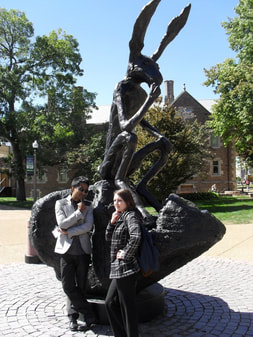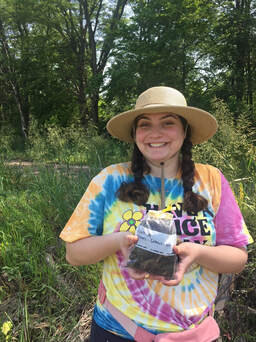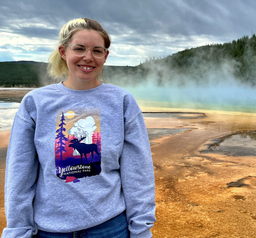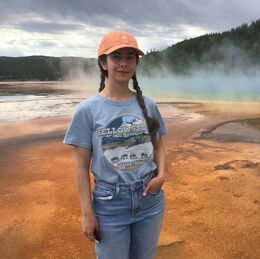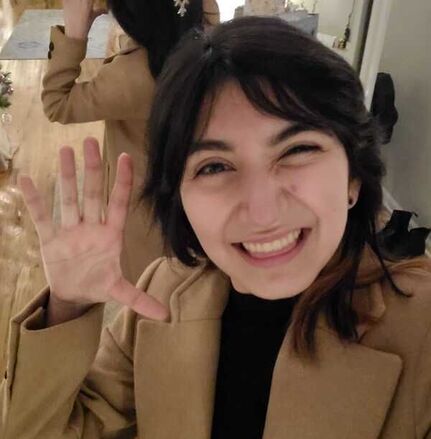PI D'Arcy R. Meyer-Dombard
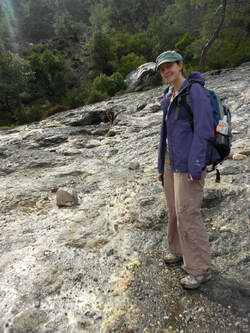
Associate Professor, Earth and Environmental Sciences at UIC
Affiliate of the Department of Biological Sciences at UIC
Contact at drmd *at* uic.edu; Office phone: 312-996-2423 [I don't answer this ;) ]
I'm interested in microbial processes in geochemically interesting environments, focussing on interfaces between microorganisms, fluids, and minerals. This includes biogeochemical cycling in hydrothermal systems, springs tapping into the "deep" biosphere, and systems where biomineralization is occurring. I use molecular (genomic), microbiological, geochemical, and isotopic parameters to identify the metabolic strategies, nutrient/energy requirements, and geochemical signatures (lipid biomarkers) of so-called "extreme" environments. My focus over the next several years will be carbon, nitrogen, and energy cycling in hydrothermal sediment and biofilm communities, and serpentinizing springs. I also have a long-standing interest in applications of Earth-analog environments in the study of Astrobiology and life in early Earth ecosystems, and currently have funding to study the ability of Earth microbes to adapt to environmental conditions like those found on the moon, Titan. New work in the area of soil microbiology in prairie, wetland, and landfill soils investigates the affect of perturbation on soil community structure and function. Check the 'Research' tab for more!
Affiliate of the Department of Biological Sciences at UIC
Contact at drmd *at* uic.edu; Office phone: 312-996-2423 [I don't answer this ;) ]
I'm interested in microbial processes in geochemically interesting environments, focussing on interfaces between microorganisms, fluids, and minerals. This includes biogeochemical cycling in hydrothermal systems, springs tapping into the "deep" biosphere, and systems where biomineralization is occurring. I use molecular (genomic), microbiological, geochemical, and isotopic parameters to identify the metabolic strategies, nutrient/energy requirements, and geochemical signatures (lipid biomarkers) of so-called "extreme" environments. My focus over the next several years will be carbon, nitrogen, and energy cycling in hydrothermal sediment and biofilm communities, and serpentinizing springs. I also have a long-standing interest in applications of Earth-analog environments in the study of Astrobiology and life in early Earth ecosystems, and currently have funding to study the ability of Earth microbes to adapt to environmental conditions like those found on the moon, Titan. New work in the area of soil microbiology in prairie, wetland, and landfill soils investigates the affect of perturbation on soil community structure and function. Check the 'Research' tab for more!
EDGElab Students
|
Judy Malas, Ph.D. Candidate - Judy graduated with B.S. in Environmental Science from Loyola University Chicago. Her research has focused on understanding microbial dynamics using laboratory cultivation techniques while working on two projects: 1) Comparative microbiology of landfill microcosms, and 2) High pressure cultivation of model organisms to investigate the potential habitability of ocean world Titan. Judy uses bioinformatics to study both of these systems through 16S rRNA gene sequencing, as well as genomics and transcriptomics. Judy’s Astrobiology work is aimed at understanding the limits of life and biosignatures at high pressure relevant to potential life on Titan.
Links to publications: https://www.frontiersin.org/articles/10.3389/fmicb.2022.891528/full www.frontiersin.org/articles/10.3389/fmicb.2020.01127/full |
|
Sarah Khoury, M.S student - Sarah Khoury (UIC graduate, B.S.) is investigating the impacts of microplastics on soil environments! As an undergraduate in the EDGElab, she experimented with adding microplastics to simulated landfill soils to see if changes occurred in those soils over time. Now as an M.S. student, Sarah has expanded that work to prairie and wetland soils. Sarah has looked to see if microplastics are a problem in soils from The Nachusa Grasslands, and is looking at how microbes from those soils colonize microplastics that were added to them. Nachusa Grasslands offers a wide range of ecotypes for study, and Sarah's microcosms consider stream sediments, wetland soils, and prairie soils. She spent considerable efforts developing methods for separation of microplastics from soils.
|
|
Jennifer Yeack, Ph.D. student - Jennifer graduated from UIC in 2022 with a B.S. in Biology, and is now pursuing a PhD in EDGElab. Jennifer's interests are in Astrobiology and she joins our Titan group. She currently working to train Shewanella oneidensis to like high pressures better than 'normal' pressures. So far, she's convinced S. oneidensis to grow under pressures up to ~40 MPa, while leaving it in the high pressure growth chamber up to a week at a time. She's also planning work that will look at the impacts of changing environmental parameters on extremophiles. You can find more information on her personal website here.
|
|
Yasaman Azizpour, Ph.D. student - Yasaman, a Biochemistry Master's graduate from Tarbiat Modares University, initially focused on halophilic and thermophilic bacteria and enzymes in the Mars-analogue site of the scorching Lut desert. Now, as a Ph.D. student, she seamlessly transitions her focus to explore microorganisms thriving in extreme hydrothermal vents, where high pressure and temperature variations challenge life's boundaries. Her research seeks to unravel the metabolic and enzymatic adaptations of these microbes, shedding light on survival strategies. Yasaman investigates enzymes in the conditions of ocean worlds like Europa, Enceladus, and Titan, utilizing a High-Pressure Experimental Culturing System. By subjecting enzymes to various pressures, temperatures, and pH levels, she uncovers the mechanisms behind enzyme (as a protein) resistance, activity, and structure under extreme circumstances.
|
|
Massie Jones, Ph.D. student - Massie's just finishing her first year of her Ph.D. program in the EDGElab, and is currently working on a project that explores the capacity of non-piezophilic organisms to tolerate high pressures. She's spent many hours re-examining the published growth tolerances of strains of Psychromonas, and has many (happy?) hours of microscopy in her future. Her next steps may take her into the realm of high pH systems, the deep biosphere, and possibly some 'omics analysis.
|
EDGElab Undergraduates
|
Tyrese Bentford- Ty comes to EDGElab as a Biology major, and he's working closely with Jenn Yeack. Ty has been instrumental in helping prepare cultures for high pressure experimentation, and is working on quantifying the growth of cells in the chamber by direct cell counts (DAPI stained cells) and bulk protein assays. He plans on beginning more independent work over the summer now that he has a feel for the research going on in the lab. More to come! Here's a link to Ty's LinkedIn page.
|
Julissa Arjon - Astrobiology captured Julie's interest years ago and she's already participated in work imaging meteorites and analyzing bioessential compounds in them AND completed an internship at NASA's Marshall Space Flight Center before even coming to EDGElab! She's currently helping out in the lab with grad student's Titan-related projects, and working on a project on the side related to landfill microbiomes. Here's a link to her CV. Julie's graduating with a B.S in Biology soon!
|
